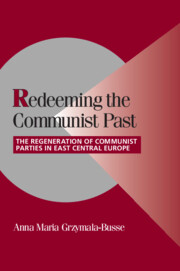Book contents
- Frontmatter
- Contents
- List of Tables
- List of Acronyms
- Acknowledgments
- INTRODUCTION: SURVIVING DEMOCRACY
- 1 THE ROOTS OF REGENERATION: COMMUNIST PRACTICES AND ELITE RESOURCES
- 2 BREAKING WITH THE PAST, REORGANIZING FOR THE FUTURE
- 3 DEVELOPING PROGRAMMATIC RESPONSIVENESS
- 4 CONVINCING THE VOTERS: CAMPAIGNS AND ELECTIONS
- 5 PARLIAMENTARY EFFECTIVENESS AND COALITIONS
- CONCLUSION: SUCCEEDING IN DEMOCRACY
- APPENDIX A THE CONTENT ANALYSIS OF PROGRAMS
- APPENDIX B THE QUANTITATIVE ANALYSIS OF ELECTORATES
- APPENDIX C THE STRUCTURES OF COMPETITION
- Bibliography
- Index
- Titles in the series
1 - THE ROOTS OF REGENERATION: COMMUNIST PRACTICES AND ELITE RESOURCES
Published online by Cambridge University Press: 04 December 2009
- Frontmatter
- Contents
- List of Tables
- List of Acronyms
- Acknowledgments
- INTRODUCTION: SURVIVING DEMOCRACY
- 1 THE ROOTS OF REGENERATION: COMMUNIST PRACTICES AND ELITE RESOURCES
- 2 BREAKING WITH THE PAST, REORGANIZING FOR THE FUTURE
- 3 DEVELOPING PROGRAMMATIC RESPONSIVENESS
- 4 CONVINCING THE VOTERS: CAMPAIGNS AND ELECTIONS
- 5 PARLIAMENTARY EFFECTIVENESS AND COALITIONS
- CONCLUSION: SUCCEEDING IN DEMOCRACY
- APPENDIX A THE CONTENT ANALYSIS OF PROGRAMS
- APPENDIX B THE QUANTITATIVE ANALYSIS OF ELECTORATES
- APPENDIX C THE STRUCTURES OF COMPETITION
- Bibliography
- Index
- Titles in the series
Summary
Communist parties seem a highly improbable source of democratic skills and effective political leadership. After all, during the four decades of their political and economic monopoly in East Central Europe, they had few incentives to devise responsive or responsible public policies and were far more adept at repression than at representation. They became the stereotype of unchanging behemoths, the progenitors of the stolid homo sovieticus and political organizations unable to change their bureaucratic and plodding ways.
Yet, as this chapter will show, elite resources held the key to the regeneration of ruling parties of the discredited regime. Since the successor party elites spent their careers in the communist parties and their auxiliaries, these resources were very likely to have their origin in the parties. Paradoxically, specific organizational practices of the communist parties – the privileging of young party activists, the constant tinkering with policy, and the “cat and mouse” game of negotiation with society and the opposition – could both sustain the parties' rule prior to 1989 and foster their democratic success afterwards.
After the communist governments fell in 1989, the opportunities presented by this regime collapse prompted scholars to ask what it took to “get the parties right.” The regime break was radical, and the communist past was discredited as a source of political norms. Therefore, the dominant approach initially argued that institutional crafting and the immediate context of a democratic transition, “comprised of norms, institutions, and international pressures, matter[ed] most to the future of liberal capitalist democracy.”
- Type
- Chapter
- Information
- Redeeming the Communist PastThe Regeneration of Communist Parties in East Central Europe, pp. 19 - 68Publisher: Cambridge University PressPrint publication year: 2002
- 1
- Cited by



